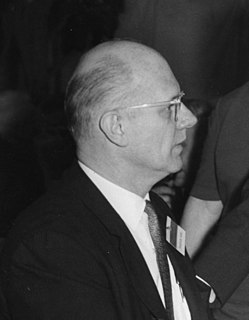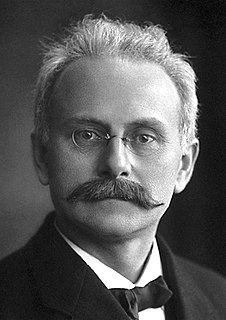A Quote by Frederick Seitz
It required unusual inquisitiveness to pursue the development of scientific curiosities such as charged pith balls, the voltaic cell, and the electrostatic machine. Without such endeavors and the evolution of associated instrumentation, initially of purely scientific interest, most of the investigations that lead to the basic equations of electromagnetism would have been missed. ... We would have been deprived of electromagnetic machinery as well as knowledge of electromagnetic waves.
Quote Topics
Associated
Balls
Basic
Been
Cell
Charged
Deprived
Development
Electromagnetic
Electromagnetic Waves
Electromagnetism
Endeavors
Equations
Evolution
Initially
Instrumentation
Interest
Investigations
Knowledge
Lead
Machine
Machinery
Missed
Most
Purely
Pursue
Required
Scientific
Unusual
Waves
Well
Without
Would
Related Quotes
The brain, which operates on electromagnetic impulses, is as much an activity of the universe as are the electromagnetic storms in the atmosphere or on a distant star. Therefore science is one form of electromagnetism that spends it time studying another formscience is god explaining god through a human nervous systemisn't spirituality the same thing?
The battle over the validity of evolution has been publicly posed as a scientific one. However, you will find little sign of it in scientific journals, where such quarrels as exist are over details, not the basic concept... Evolution has proved so useful as a paradigm for the origin and structure of life that it constitutes the foundation of the sciences of biology and medicine.
Now, since the time of Newton there had been a debate about whether light was a wave - that is, a traveling disturbance in some background medium - or a particle, which travels regardless of the presence of a background medium. The observation of Maxwell that electromagnetic waves must exist and that their speed was identical to that of light ended the debate: light was an electromagnetic wave.
The basic question that the 'new science' raises for our balance sheet is the issue of what scientific questions have not been asked for 500 years, which scientific risks have not been pursued. It raises the question of who has decided what scientific risks were worth taking, and what have been the consequences in terms of the power structures of the world.
In the case of some people, not even if we had the most accurate scientific knowledge, would it be easy to persuade them were we to address them through the medium of that knowledge; for a scientific discourse, it is the privilege of education to appreciate, and it is impossible that this should extend to the multitude.
In scientific thought, the concept functions all the better for being cut off from all background images. In its full exercise, the scientific concept is free from all the delays of its genetic evolution, an evolution which is consequently explained by simple psychology. The virility of knowledge increases with each conquest of the constructive abstraction.
Despite its potential, the federal government has restricted funding for creating new cell lines - putting the burden of any future research squarely on the shoulders of the private sector. Government's most basic responsibility, however, is the health and welfare of its people, so it has a duty to encourage appropriate scientific investigations that could possibly save the lives of millions.
I argue that science would be much richer if it were multisensory. The problem with instrumentation is that instruments, unlike our senses, can be monosensory. Since the discovery of the electromagnetic spectrum - which is really the discovery that all energy coming from something has a wave form - in theory we could image anything along that spectrum. In fact, we don't, because only certain parts of the spectrum have been instrumentalized. But the new thing is computerization. You can take all the data, the measurement of the frequencies, and transform it into an image.
There are types of energy which lie outside the electromagnetic spectrum. Unfortunately, these research efforts have not been given recognition. For the most part, they have been performed by individuals without any support, whose work lies at the threshold of present-day science, and who are years ahead of science which is already established.

































